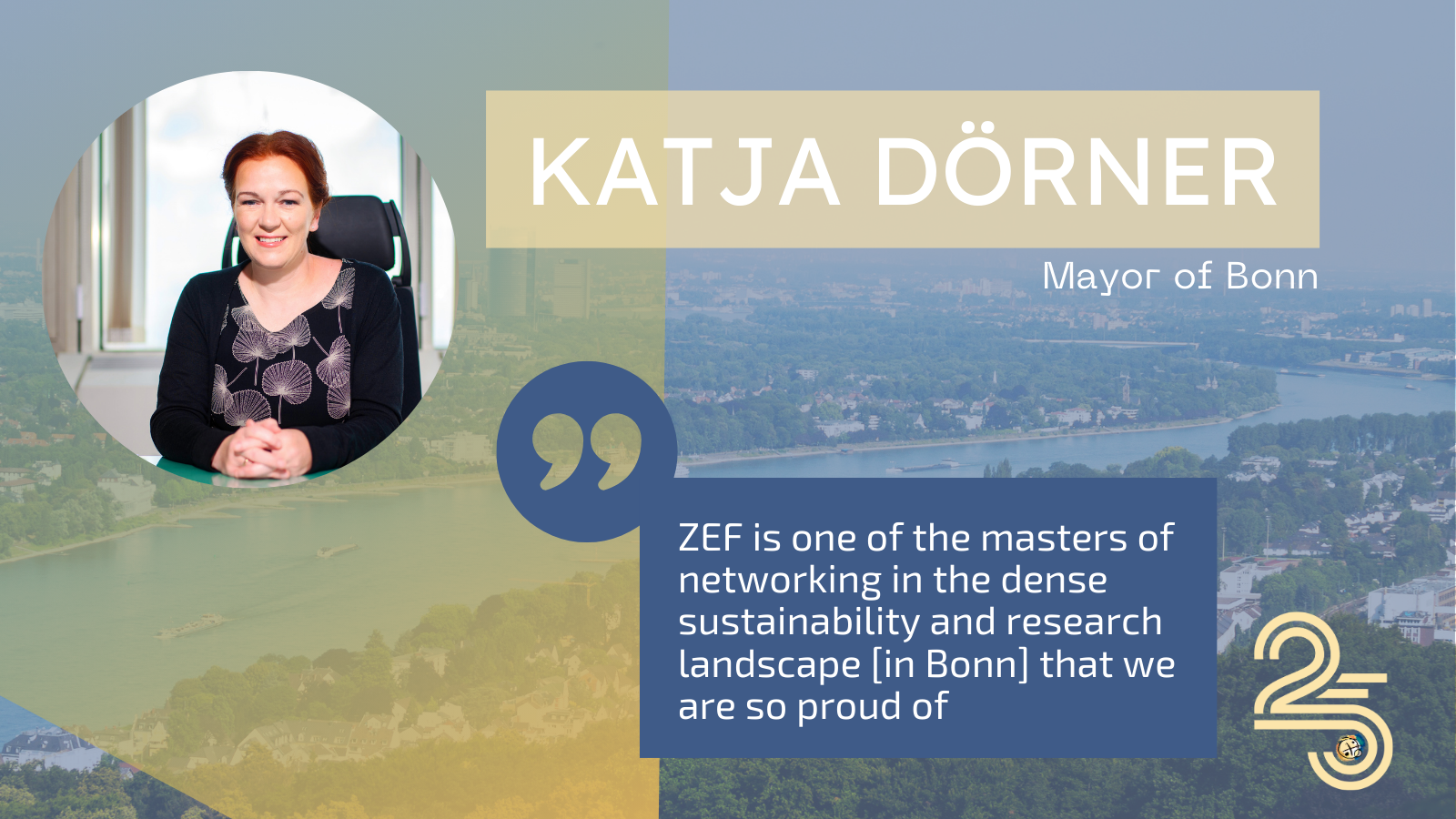Dear readers,
The Center for Development Research (ZEF) is celebrating the 25th anniversary of its international doctoral program. When this program was launched back in 1999, two years after the institute itself had become operational, it was not only a first at the University of Bonn (followed by many other international programs over time) but also spearheading the establishment of structured doctoral programs in Germany. Looking back at almost 500 Alumni and Alumnae from 80 countries, who pursued their research here in Bonn over the past 25 years, I wholeheartedly applaud the makers and drivers of this program, which has become a landmark in both the development and research landscape of Bonn.
When we think of the 1990s in Germany, we think of the end of the cold war and a new positioning of East and West, epitomised by German reunification. When we think of Bonn in the 1990s, we think of the decision to move the parliament and parts of the federal government to Berlin. And we see Bonn reinventing itself as a federal city, a UN and international meeting place and a center for science and development research in Germany, with the Berlin/Bonn Act and the compensation agreement of 1994 paving the way for the city’s new profile. With the support of the Federal and State Governments (NRW), new organizations and institutions were founded together with the City of Bonn to strengthen this new profile – including the launch of the Center for Development Research (ZEF) as part of the Center for International Cooperation and as a welcome addition to the science and research region.
When I as a mayor look at our Bonn of today, I have to praise the decision makers and visionaries of the early 1990s for their ideas, passion and diligence. Without them, Bonn would not be the sustainability hub, the international meeting place, the federal city and excellent research landscape that it is today.
It has been a long and rewarding journey from the first steps in 1993 towards a North-South Centre for Development Research as a source of inspiration for science, culture, politics and business to today’s ZEF. From the very beginning, interdisciplinary research on political, socio-economic and cultural framework conditions, the potential of nature and ecology, the sustainability of technical and scientific change as well as training, research and practical policy relevance have been on ZEF’s agenda.
ZEF has always played a key role in Bonn’s development as an international center for science and development research. ZEF’s leadership supported for example the establishment of a new branch of the United Nations University in Bonn. UNU-EHS, the Institute for Environment and Human Security, has just celebrated its 20th anniversary itself.
What makes ZEF so special to me as a mayor, is the history of excellent collaboration between Bonn and ZEF. This ranges from joint presentations at events such as United Nations Days, Science Nights, Sustainability Weeks and Open Days to what I would describe as our flagship collaboration: the establishment of The Right Livelihood Campus in 2011 as a result of a meeting of the Right Livelihood Laureates in 2010. Bonn benefits greatly from this ongoing exchange with these visionaries of sustainability, who come to the RLC Campus for annual events.
When people talk about Bonn’s international profile, the unique networking culture of our city often comes to mind. ZEF is one of the masters of networking in the dense sustainability and research landscape that we are so proud of – engaged in the Bonn Alliance for Sustainability Research, the Bonn Climate Group, the Bonn Water Network, Bonn.realis, the Biodiversity Research Network BION and gender@international Bonn alike.
This year, ZEF and its PhD program celebrate their 25th anniversary. Today, ZEF offers science-based and transdisciplinary solutions to global livelihood issues related to poverty, inequality, food security, land use, governance, migration, urbanization and health – all closely linked to the thematic framework of UN Bonn and the embedding sustainability cluster. No wonder that many of the nearly 500 alumni and alumnae have continued their work at ZEF as postdocs and senior researchers and are actively contributing to solving global and local problems through their work in international organizations, governments, research institutes, companies, NGOs and civil society initiatives.
It’s never the institutions, it’s the people: Visionaries and decision-makers who brought ZEF to life in the 1990s, the leadership up to the current Director Matin Qaim, the scientists who are passionate about their field of research, the supporters at all levels and, of course, those who are at the heart of this research – because sustainable development is about people and leaving no one behind.
Happy anniversary and THANK YOU, ZEF! Here’s hoping for many more years of excellence, networking and collaboration!
Katja Dörner has been Mayor of Bonn since November 2020



Leave a Reply